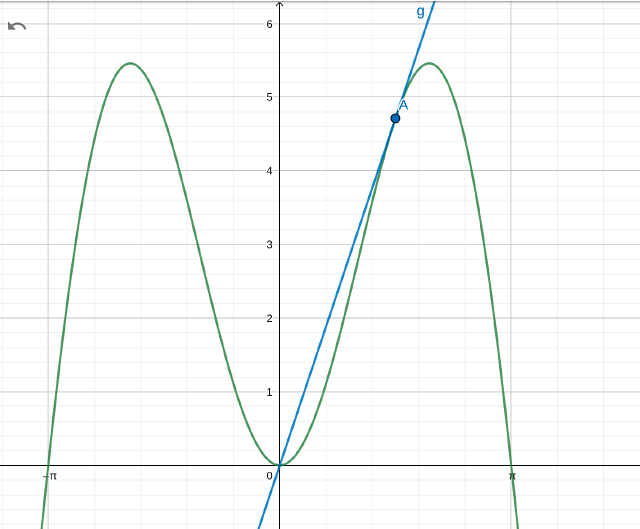Section 2.4, derivatives of trig functions
Derivatives of Trig Functions
We saw last time the derivatives of sine and cosine which will be repeated here:
$\dfrac{d}{dx} (\sin (x)) = \cos (x)$
$\dfrac{d}{dx} (\cos (x)) =- \sin (x)$
Let’s use them to derive1 the rest of the formulas.
Tangent and cotangent
$\dfrac{d}{dx}( \tan(x)) = \sec^{2}(x)$
We saw this last time, too. Use the quotient rule. If you don’t remember, try it again!
$\dfrac{d}{dx} (\cot(x)) = -\csc^{2}(x)$
Follow the same approach and use the quotient rule. Ask questions if you are unsure where to go.
Secant and cosecant
- $\dfrac{d}{dx} (\sec(x)) = \sec (x) \tan (x)$
$\dfrac{d}{dx} (\csc(x)) = \csc (x) \cot (x)$
Repeat the above argument with cosecant and verify you can get this one.
Putting them all together
Many examples
- Find the derivative of $y = x^2 \sec (x)$
- Differentiate with respect to $t$, $y = \cos t + \sqrt{t}\sin(t)$
- Find the slope of the line tangent to $y = 3x \sin x$ at the point $(\pi/2, 3\pi/2)$
Here’s a picture (the blue line is $y=3x$ while the green curve is $y=3x\sin x$).

- A ladder 20 ft long rests against a vertical wall. Let 𝜃 be the angle between the top of the ladder and the wall and let x be the distance from the bottom of the ladder to the wall. If the bottom of the ladder slides away from the wall, how fast does $x$ change with respect to $\theta$ when $\theta = \pi/4$?
VIDEO HERE
Now some limits
Here’s an important limit that we’ll come back to often:
$$ \lim_{t \to 0} \frac{\sin t}{t} = 1 $$
and
$$ \lim_{t \to 0} \frac{\cos(t) - 1}{t} = 0 $$
Deriving the derivative of sine.
Let’s use the definition of the derivative to find the derivative of $\sin x$.
$$ \frac{d}{dx} (\sin x) = \lim_{h \to 0} \dfrac{\sin(x + h) - \sin(x)}{h} $$
Finding more complicated limits
Find the limit $\displaystyle \lim_{t \to 0} \dfrac{\sin(4t)}{\tan(20t)}$
Now practice!
Head over to WebAssign and work on the exercises.
Have a question? A comment? Want to clarify something above or on your homework set? Let me know!
Note that the word “derive” means “come up with.” It doesn’t mean ‘find the derivative,’ though in this case we are deriving the derivative. ↩︎